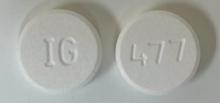Lanthanum carbonate Disease Interactions
There are 2 disease interactions with lanthanum carbonate.
Lanthanum carbonate (applies to lanthanum carbonate) bowel obstruction
Major Potential Hazard, Moderate plausibility. Applicable conditions: Gastrointestinal Obstruction
The use of lanthanum carbonate is contraindicated in patients with bowel obstruction, including ileus and fecal impaction.
References
- "Product Information. Fosrenol (lanthanum carbonate)." Shire US Inc (2004):
Lanthanum carbonate (applies to lanthanum carbonate) gastrointestinal disease
Moderate Potential Hazard, Moderate plausibility. Applicable conditions: Gastrointestinal Diverticula, Gastroparesis, Gastrointestinal Perforation, History - Peptic Ulcer
Serious cases of gastrointestinal obstruction and perforation have been reported in patients taking lanthanum, some requiring surgery and hospitalization. Risk factors identified from post marketing reports include altered gastrointestinal anatomy (diverticular disease, peritonitis, history of GI surgery, ulceration or cancer), hypomotility disorders, and some concomitant medications as calcium channel blockers. However, some cases have also been reported in patients with no history of gastrointestinal disease. Lanthanum should be used cautiously in patients with gastrointestinal disease.
References
- "Product Information. Fosrenol (lanthanum carbonate)." Shire US Inc (2004):
Lanthanum carbonate drug interactions
There are 85 drug interactions with lanthanum carbonate.
Lanthanum carbonate alcohol/food interactions
There is 1 alcohol/food interaction with lanthanum carbonate.
More about lanthanum carbonate
- lanthanum carbonate consumer information
- Check interactions
- Compare alternatives
- Pricing & coupons
- Reviews (7)
- Drug images
- Side effects
- Dosage information
- During pregnancy
- Drug class: phosphate binders
- Breastfeeding
- En español
Related treatment guides
Drug Interaction Classification
| Highly clinically significant. Avoid combinations; the risk of the interaction outweighs the benefit. | |
| Moderately clinically significant. Usually avoid combinations; use it only under special circumstances. | |
| Minimally clinically significant. Minimize risk; assess risk and consider an alternative drug, take steps to circumvent the interaction risk and/or institute a monitoring plan. | |
| No interaction information available. |
Further information
Always consult your healthcare provider to ensure the information displayed on this page applies to your personal circumstances.


